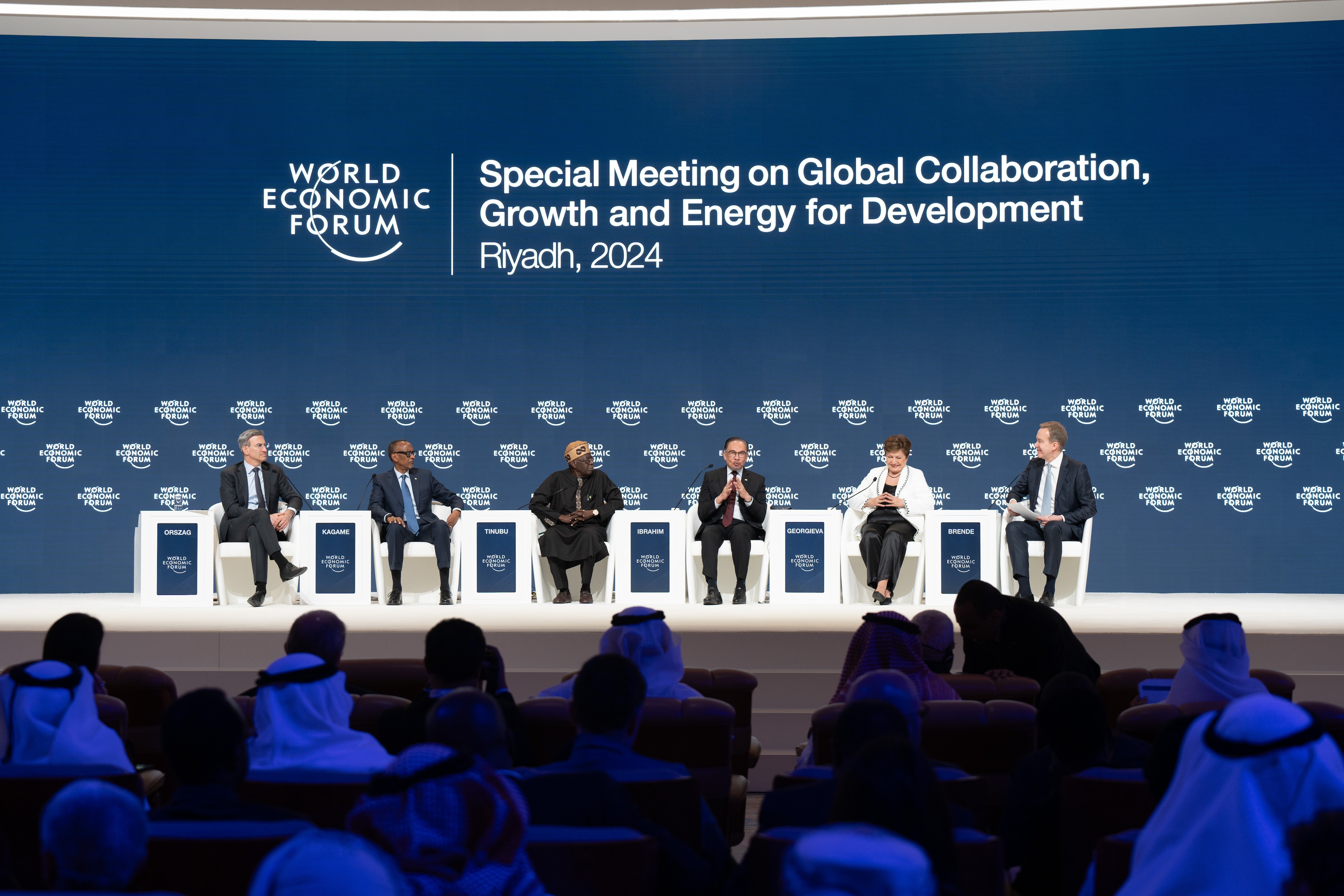How businesses can create the green markets of the future

Many of the businesses that will be resilient and relevant for the future are still actively being built and shaped today. Image: Katie Rodriguez on Unsplash

Get involved with our crowdsourced digital platform to deliver impact at scale
Stay up to date:
Davos Agenda
Listen to the article
This article was originally published by Eco-Business.
- The collapse of natural ecosystems will inevitably and eventually lead to the collapse of economies and societies.
- A transformation of socio-economic systems is critically needed.
- The Forum's Annual Meeting of the New Champions in Tianjin, China, will convene multi-stakeholder dialogues around how businesses can advance the transition to climate- and nature-positive operating models.
The environmental crisis is intertwined with crises in public health, food and water security, social cohesion and job stability, creating consequences much worse than each on their own will exert on our socio-economic systems.
This polycrisis will manifest itself as a humanitarian crisis – we are already witnessing droughts, wildfires and extreme heat at unprecedented scale. It will also manifest itself as financial and geopolitical crises – with stranded assets, job losses and large scale forced migration. The collapse of natural ecosystems will inevitably and eventually lead to the collapse of economies and societies.
Scientists have categorised the planet across eight earth systems – climate, air, fresh water and ground water, biodiversity – within natural ecosystems and working landscapes, fertilisers – nitrogen and phosphorous. Of the eight, human activities have pushed seven into the risk zone. The urgent challenge for this generation is to avert a global catastrophe and create a ‘safe and just’ corridor for humanity.
Leadership in Systems Transformation
A transformation of socio-economic systems is critically needed. There are three major ones: food, land and ocean use; infrastructure and the built environment; energy and extractives. Together, these represent more than one third of the global economy and provide up to two third of all jobs, accounting for the drivers that endanger almost 80% of the threatened species.
Across all three systems, businesses must transform the way individuals eat, live, grow, build and power our lives. This requires pathways and solutions that can restore a more harmonious relationship between human and nature, alongside the pursuit of development and an improvement in overall quality of life.
Business as usual will not work. Neither will incremental changes be sufficient to address the enormity of the challenge. We need nature and climate leadership, one which embodies both ecological intelligence and entrepreneurship, to pioneer and innovate for a new age of sustainability.
Ecological intelligence is commonly understood as an ability to understand the vital and intricate connections between human and nature, to be aware of the business footprint on the environment and its immediate and also longer-term consequences. And more importantly, to be able to pursue solutions and outcomes that better balance Earth’s restorative capacity with business impact and stewardship of natural resources.
Entrepreneurship is characterised as the drive to challenge and disrupt established thinking and practices, to find opportunity in uncertainty and scarcity, to take risks, experiment and learn while charting the paths forward. This also extends to the ability to forge new and surprising partnerships- exchange ideas and share resources, leverage capabilities and maximise opportunity, so as to move more quickly than would be possible alone. Partnership should be interpreted in its broadest sense: partnerships with government and international institutions, partnerships across value chains with buyers, suppliers and innovators, partnerships with local communities and grassroots organisations.
This is particularly important, not just to stay ahead of a closing window for nature and climate action, but also for businesses looking to keep pace with evolving technologies, reconfiguration of global value chains, changing regulations and shifting expectations. Many of the businesses that will be resilient and relevant for the future are still actively being built and shaped today.
Opportunity in Crisis for All Businesses
When business leadership combines ecological intelligence with entrepreneurship, it could yield significant economic value. Research has illustrated that a new nature positive economy could generate up to $10.1 trillion in annual business value and create 395 million jobs by 2030. Similarly, the consequences of unchecked climate change will cost the global economy $178 trillion USD by 2070, while the global economy could gain $43 trillion USD in the same timeframe by rapidly accelerating the transition to net zero.
The last years have witnessed an increase in pioneering efforts by businesses, with promising successes.
For example, the Envision Group in China transformed a coal producing region in Ordos, Inner Mongolia, to a net zero industrial park, enabling entire regions to accelerate reductions in carbon emissions. The industrial park integrates the supply chains of related industries, such as electric vehicle and battery manufacturing and features comprehensive clean energy solutions powered by the latest wind, solar and hydrogen power technologies. This ensures 100% green power supply through cooperation with the power grid.
The industrial park will also be connected to a fully electric truck transportation system and intelligently managed by Envision’s AI-based operating system, EnOS. Through building an ecosystem of suppliers and users, the net zero industrial park will also act as a test bed and incubator for cross-industry collaboration and innovative technologies that are needed for the energy transition.
The STATE GRID corporation of China (SGCC) took the initiative to analyse its impact and dependence on nature, using the Natural Capital Protocol as reference. It reviewed the full cycle of its actions, from power grid planning and designing, to construction and maintenance.
One of the outcomes from the review was an increase in the overall height of the high span iron towers by 20-40 metres at the Western Tianshan Nature Reserve Power Grid in Xinjiang. The resultant design and development minimises biodiversity loss and provides a 100-year growth buffer for the Picea schrenkiana, a national key protected wild plant.
The new service platform from Syngenta Group China’s Modern Agriculture Platform (MAP) Centres enables farmers to modernize their farms and grow high-quality, traceable crops in a climate-smart way. These crops are in turn sold at a premium to commercial buyers.
Under the digital agriculture system built by MAP, farmers can access a variety of services including more accurate weather forecasts, satellite remote sensing monitoring of field crop growth, and land plot visualisation management. For example, the “Zhonghe-50” (carbon neutral) wheat developed from this system secures crop yields while effectively reducing GHG emissions, improving soil health, increasing farmland biodiversity, and protecting pollinators and their habitats.
While there is progress and promise, no doubt, the journey for sustainability has only just started. There is still much scope for innovation and partnership to transform our economies and societies, and fully bend the curve on emissions, reverse biodiversity loss, as well as better protect and restore our natural ecosystems.
To exercise leadership, businesses need to focus on building ecologically intelligent systems, translating these into polices, processes and practices within their organisations, while encouraging and instilling the entrepreneurial spirit in building partnerships and finding solutions.
At the Annual Meeting of the New Champions in Tianjin, China, multi stakeholder dialogues and high-level panel conversations will be centred on how businesses can innovate on new opportunities in the transition to climate- and nature-positive operating models. Notably, ministers from major economies, CEOs and civil society leaders will discuss key topics, share insights and exchange best practices, as well as explore the policies, technologies and partnerships needed, to co create the green markets of the future.
Don't miss any update on this topic
Create a free account and access your personalized content collection with our latest publications and analyses.
License and Republishing
World Economic Forum articles may be republished in accordance with the Creative Commons Attribution-NonCommercial-NoDerivatives 4.0 International Public License, and in accordance with our Terms of Use.
The views expressed in this article are those of the author alone and not the World Economic Forum.
Related topics:
The Agenda Weekly
A weekly update of the most important issues driving the global agenda
You can unsubscribe at any time using the link in our emails. For more details, review our privacy policy.
More on Forum InstitutionalSee all
Gayle Markovitz
April 28, 2024
Gayle Markovitz
April 27, 2024
Mirek Dušek and Maroun Kairouz
April 27, 2024
Kate Whiting
April 26, 2024
Spencer Feingold and Gayle Markovitz
April 19, 2024
Kate Whiting
April 17, 2024






